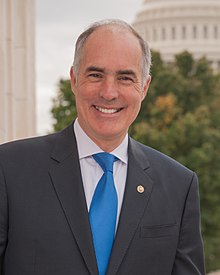Portal:Pennsylvania
The Pennsylvania Portal Pennsylvania (/ˌpɛnsɪlˈveɪniə/ ⓘ, lit. 'Penn's forest country'), officially the Commonwealth of Pennsylvania (Pennsylvania Dutch: Pennsylvanie), is a state spanning the Mid-Atlantic, Northeastern, Appalachian, and Great Lakes regions of the United States. Pennsylvania borders Delaware to its southeast, Maryland to its south, West Virginia to its southwest, Ohio and the Ohio River to its west, Lake Erie and New York to its north, the Delaware River and New Jersey to its east, and the Canadian province of Ontario to its northwest. Pennsylvania was founded in 1681 through a royal land grant to William Penn, the son of the state's namesake. Prior to that, between 1638 and 1655, a southeast portion of the state was part of New Sweden, a Swedish Empire colony. Established as a haven for religious and political tolerance, the colonial-era Province of Pennsylvania was known for its relatively peaceful relations with native tribes, innovative government system, and religious pluralism. Pennsylvania played a vital and historic role in the American Revolution and the ultimately successful quest for independence from the British Empire, hosting the First and Second Continental Congress leading to the adoption of the Declaration of Independence. On December 12, 1787, Pennsylvania became the second state to ratify the U.S. Constitution. The bloodiest battle of the American Civil War, at Gettysburg over three days in July 1863, proved the war's turning point, leading to the Union's preservation. Throughout the late 19th and 20th centuries, the state's manufacturing-based economy contributed to the development of much of the nation's early infrastructure, including key bridges, skyscrapers, and military hardware used in U.S.-led victories in World War I, World War II, and the Cold War. Pennsylvania's geography is highly diverse. The Appalachian Mountains run through the center of the state; the Allegheny and Pocono mountains span much of Northeastern Pennsylvania; close to 60% of the state is forested. While it has only 140 miles (225 km) of waterfront along Lake Erie and the Delaware River, Pennsylvania has the most navigable rivers of any state in the nation, including the Allegheny, Delaware, Genesee, Ohio, Schuylkill, Susquehanna, and others. (Full article...) This is a Featured article, which represents some of the best content on English Wikipedia..
 Thaddeus Stevens (April 4, 1792 – August 11, 1868) was an American politician and lawyer who served as a member of the United States House of Representatives from Pennsylvania, being one of the leaders of the Radical Republican faction of the Republican Party during the 1860s. A fierce opponent of slavery and discrimination against black Americans, Stevens sought to secure their rights during Reconstruction, leading the opposition to U.S. President Andrew Johnson. As chairman of the House Ways and Means Committee during the American Civil War, he played a leading role, focusing his attention on defeating the Confederacy, financing the war with new taxes and borrowing, crushing the power of slave owners, ending slavery, and securing equal rights for the freedmen. Stevens was born in rural Vermont, in poverty, and with a club foot, which left him with a permanent limp. He moved to Pennsylvania as a young man and quickly became a successful lawyer in Gettysburg. He interested himself in municipal affairs and then in politics. He was an active leader of the Anti-Masonic Party, as a fervent believer that Freemasonry in the United States was an evil conspiracy to secretly control the republican system of government. He was elected to the Pennsylvania House of Representatives, where he became a strong advocate of free public education. Financial setbacks in 1842 caused him to move his home and practice to the larger city of Lancaster. There, he joined the Whig Party and was elected to Congress in 1848. His activities as a lawyer and politician in opposition to slavery cost him votes, and he did not seek reelection in 1852. After a brief flirtation with the Know-Nothing Party, Stevens joined the newly formed Republican Party and was elected to Congress again in 1858. There, with fellow radicals such as Massachusetts Senator Charles Sumner, he opposed the expansion of slavery and concessions to the South as the war came. (Full article...)Selected geography article -
West Creek is a tributary of Fishing Creek, in Columbia County and Sullivan County, in Pennsylvania, in the United States. It is 9.1 miles (14.6 km) long and flows through Davidson Township in Sullivan County and Jackson Township, Sugarloaf Township, Benton Township, and Benton in Columbia County. The water temperature of the creek ranges from 0 °C (32 °F) to 25 °C (77 °F). The discharge ranges from nearly zero to ten cubic meters per second (0 to 353 cu ft/s). Rock formations in the watershed include the Trimmers Rock Formation, the Catskill Formation, and the Huntley Mountain Formation. The creek's watershed has an area of 16.6 square miles (43 km2), most of which is agricultural, forested, or urban land. A small number of dams, mills, and schoolhouses were built on West Creek in the 19th and early 20th century. West Creek has the highest level of biodiversity of any stream in the upper Fishing Creek watershed. (Full article...)
Selected image -Did you know -
Related portalsWikiprojectsThis is a Good article, an article that meets a core set of high editorial standards.
Michael "Dodo" Marmarosa (December 12, 1925 – September 17, 2002) was an American jazz pianist, composer, and arranger. Originating in Pittsburgh, Pennsylvania, Marmarosa became a professional musician in his mid-teens, and toured with several major big bands, including those led by Tommy Dorsey, Gene Krupa, and Artie Shaw into the mid-1940s. He moved to Los Angeles in 1945, where he became increasingly interested and involved in the emerging bebop scene. During his time on the West Coast, he recorded in small groups with leading bebop and swing musicians, including Howard McGhee, Charlie Parker, and Lester Young, as well as leading his own bands. (Full article...)Selected article -Robert Patrick Casey Jr. (born April 13, 1960) is an American lawyer and politician who is the senior United States senator from Pennsylvania, a seat he has held since 2007. He is a member of the Democratic Party. Born in Scranton, Pennsylvania, Casey, Jr. is the son of Bob Casey Sr., a former governor of Pennsylvania. Raised Catholic, he attended the College of the Holy Cross, later receiving his Juris Doctor from the Catholic University of America. He practiced law in Scranton before beginning his political career as Pennsylvania Auditor General, a post to which he was elected in 1996 and re-elected in 2000, holding the post until 2005. (Full article...)Pennsylvania news
CategoriesState factsState Facts
State symbols
Pennsylvania topicsGeneral imagesThe following are images from various Pennsylvania-related articles on Wikipedia.
Associated WikimediaThe following Wikimedia Foundation sister projects provide more on this subject:
Discover Wikipedia using portals |

































































